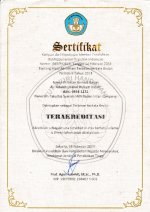Juridical Study of the Constitutional Court's Decision No. 22/PUU-XV/2017 Regarding Restriction of Marriage Age in the Perspective of Maslahah Theory by Muhammad Saʻîd Ramaḏân Al-Bȗṯî’s and Gender Equality in Islam
Abstract
This article is intended to answer questions on the legal considerations of the Constitutional Court Decision No. 22/PUU-XV/2017 regarding the minimum age of marriage for women and how the Judgment is seen from the Muhammad Saʻîd Ramaḏân al-Bûṯî's maslahah theory and the theory of gender equality in Islam. From the conducted studies, several conclusions can be drawn. First, the Judge's legal considerations in canceling the minimum age of marriage in decision No. 22/PUU-XV/2017 are based on consideration of discrimination acts, health and educational aspects, child exploitation, the minimum age requirement for marriage in various countries, and policy demands related to marriage age. Second, in terms of the al-Bûṯî’s maslaẖah theory, the Constitutional Court's ruling on the equalization of marital age between men and women is not categorized as a maslahah, since it does not meet the five criteria for something to be called as a maslahah. Third, according to the gender equality theory in Islam, it can be concluded that the Constitutional Court's decision is not suitable to the theory, since the meaning of equality in Islam is not to be equal but rather to the fulfillment of rights according to the level of needs.
Keywords
Full Text:
PDFReferences
Âlûsî, Al-Sayyid Maẖmûd al-. Rûẖ Al-Maʻânî Fî Tafsîr Al-Qur’an al-‘Aẕîm Wa al-Sabʻ al-Matsânî, 2. Beirut: Dâr al-Kutub al-‘Ilmiyyah, 1994.
‘Aṯiyyah, Jamâluddîn, Naẖwa Tafʻîl Maqâsid Al-Syarîʻah. Damaskus: Dâr al-Fikr, 2001.
Bûṯî, Muẖammad Saʻîd Ramaḏân al-. Ḏawâbiṯ Al-Maslaẖah Fî al-Syarîʻah al-Islâmiyyah Damaskus: Mu’assasah al-Risâlah, 1973.
———, Perempuan Antara Kedzaliman Sistem Barat Dan Keadilan Islam, Karangsem: Era Intermedia, 2002.
-------. Perempuan Dalam Pandangan Hukum Barat Dan Islam. Yogyakarta: Suluh Press, t.t.
Ghazâlî, Abû Hâmid al-. Iẖyâ’ ‘Ulûm al-Dîn, 1. Beirut: Dâr al-Maʻrifah, 2010.
--------. Al-Mustasfâ Min ‘Ilm al-Usûl. Baghdâd: Musannâ, 1970.
Ismail, Paizah, ‘Status Wan Ita Dalam Islam: Antara Prinsip Syariah Dan Ijtihad Fuqaha’, Jurnal Syariah, 11.2 (2019).
Kaharuddin, Nilai-Nilai Filosofi Perkawinan Menurut Hukum Perkawinan Islam Dan Undang-Undang RI Nomor 1 Tahun 1974 Tentang Perkawinan, Jakarta: Mitra Wacana Media, 2015.
Khalâf, ʻʻAbdul Wahhâb. Ilm Usûl Fiqh Wa Khulasah Al-Tasyrîʻ al-Islâmî, Kairo: Dâr al-Fikr al-ʻArabiy, 1996.
Koto, Alaiddin. Ilmu Fiqh Dan Ushul Fiqh. Jakarta: Raja Grafindo Persada, 2004.
Martiany, Dina. ‘Pro Dan Kontra RUU Kesetaraan Dan Keadilan Gender (KKG)’, Info Singkat Kesejahteraan Social, 2012
Muslim bin Hajjâj, Sâẖiẖ Muslim, 4th edn. Jeddah: Dâr al-Minhâj, 2003.
Qârî, ʻAlî al-. Syarh Musnad AbîHanîfah, 1. Beirut: Dâr al-Kutub al-‘Ilmiyyah, 1995.
Rofiq, Ahmad. Hukum Perdata Islam Di Indonesia. Jakarta: Rajawali Press, 2013.
R. Subekti dan R. Tjitrosudibi, Kitab Undang-Undang Hukum Perdata, 15. Jakarta: Pradnya Paramita, 1982.
Syalabî, Muḥammad Musṯafâ. Taʻlîl Al-Aẖkâm, Beirut: Dâr al-Nahḏah al-‘Arabiyyah, 1981.
Syatsrî, Saʻd ibn Nâsir al-. Syarẖ Qawâʻid Al-Usûl Wa Maʻâqid al-Fusûl, 1st edn. Riyad: Dâr Kunûz Isybîliyâ, 2006)
Umar, Nasaruddin. Argumen Kesetaraan Jender Perspektif Al-Qur’an. Jakarta: Paramadina, 1999.
Yanggo, Huzaemah Tahido. Fikih Perempuan Kontemporer, Bogor: Ghalia Indonesia, 2010.
———, Pandangan Islam Tentang Gender. Surabaya: Risalah Gusti, 1996.
Zuẖaîlî, Wahbah al-. Al-Fiqh Al-Islâmî Wa Adillatuh, 2nd edn. Suriah: Dar al-fikr, 1985.
-------, Usûl Al-Fiqh al-Islâmî, Damaskus: Dâr al-Fikr, 1986.
DOI: http://dx.doi.org/10.24042/adalah.v17i1.6316
Refbacks
- There are currently no refbacks.
Copyright (c) 2020 AL-'ADALAH
Al-'Adalah is licensed under a Creative Commons Attribution-ShareAlike 4.0 International License.



.png)
_(1).png)
_(1).png)

.png)
